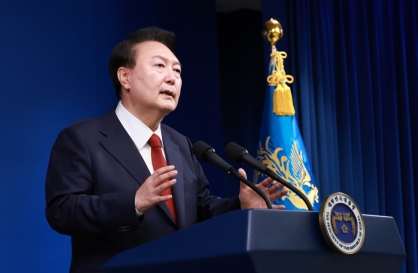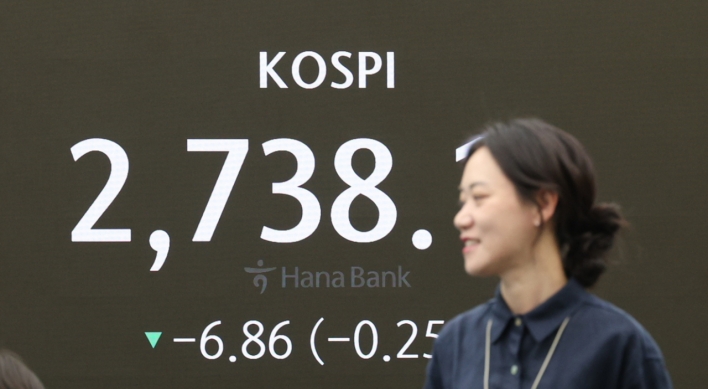The South Korean financial markets plunged on the news about North Korean leader Kim Jong-il’s sudden death on Saturday. They did so with good reason. One of the investor concerns was undoubtedly the possibility of a power struggle breaking out in North Korea in the aftermath of Kim’s death and an ensuing calamity spilling over into the South.
When his death was announced two days later, on Monday, South Korea’s benchmark stock index lost 3.43 percent, or 63 points, and closed at 1,776.93. The Korean currency’s value against the U.S. dollar was slashed by a whopping 16.2 won per dollar.
With the financial markets recovering from the initial shock now, it is worth comparing what happened on Monday with the impact of Kim Il-sung’s death in 1994 on the South Korean economy.
On the news about Kim Il-sung’s death, South Korean stocks rose, not declined, albeit by an insignificant margin of 3.25 points. The Korean currency’s value dropped by a negligible amount of 1.2 won per dollar. In other words, Kim Il-sung’s death had little impact on the South Korean economy.
It is conceivable that the different market reactions were attributable to the different economic conditions now and then to a certain extent. More important to investors, however, was in which way power was most likely to be handed over in the communist state ― in an orderly or disorderly manner.
It was believed that transition would proceed without a hitch when Kim Il-sung died, because Kim Jong-il, 52 at the time, had already served as his heir apparent for two decades. But there were doubts galore about a smooth father-to-son succession this time, with Kim Jong-il’s heir still in his 20s. Moreover, it had been less than two years since Kim Jong-il anointed his third son, Jong-un, as his successor.
As such, not many are convinced that the young Kim with insufficient governing experience is well prepared to hold on to the leadership of an isolated communist state with a population of 24 million people. No wonder the South Korean finance minister referred to “concerns (that might be harbored by some) that Kim’s death would heighten the level of our economy’s short-term uncertainties.”
As indicated by global sovereign ratings agencies, however, the South Korean economy is strong enough to weather such a disruption as Kim’s death. Moody’s, Standard and Poor’s and Fitch ratings agencies said that they would not downgrade South Korea’s credit rating on the news about Kim’s death. Moreover, it is safe to assume that the security threat North Korea poses to the South is already reflected in what is called “Korea discount,” or the amount by which investors undervalue South Korean stocks.
Another North Korea risk is the potential mass influx of refugees in the event of a leadership collapse. Here again, South Koreans may well have self-confidence. As an economic expert says, South Korea could afford to feed not just the refugees but the entire North Korean population for one year at the cost of $10 billion.
True, $10 billion would not be a small amount of money for South Korea. But the expert says spending as much would not be intolerable to a nation with huge current account surpluses if it were on an emergency footing. Moreover, its economic fundamentals are sound, as evidenced by its ability to tide over the recent global economic hardships.
Though its financial markets are regaining stability, however, South Korea must not lower its guard against new crises that may hit North Korea until a firm leadership is established in the communist state. It needs to prepare itself to deal adequately with any spillover from them.
Under such circumstances, South Korea will have to draw up contingency plans, including one on the control of foreign exchange flows. It will be necessary to share information on such contingency plans with international financial institutions, including the International Monetary Fund, to win their support and with sovereign ratings agencies to earn their trust.
In addition, South Korea will have to speak in one voice, instead of sending out confusing signals, if it desires to forestall any misunderstanding from the international community and prevent investor confidence from being damaged.
When his death was announced two days later, on Monday, South Korea’s benchmark stock index lost 3.43 percent, or 63 points, and closed at 1,776.93. The Korean currency’s value against the U.S. dollar was slashed by a whopping 16.2 won per dollar.
With the financial markets recovering from the initial shock now, it is worth comparing what happened on Monday with the impact of Kim Il-sung’s death in 1994 on the South Korean economy.
On the news about Kim Il-sung’s death, South Korean stocks rose, not declined, albeit by an insignificant margin of 3.25 points. The Korean currency’s value dropped by a negligible amount of 1.2 won per dollar. In other words, Kim Il-sung’s death had little impact on the South Korean economy.
It is conceivable that the different market reactions were attributable to the different economic conditions now and then to a certain extent. More important to investors, however, was in which way power was most likely to be handed over in the communist state ― in an orderly or disorderly manner.
It was believed that transition would proceed without a hitch when Kim Il-sung died, because Kim Jong-il, 52 at the time, had already served as his heir apparent for two decades. But there were doubts galore about a smooth father-to-son succession this time, with Kim Jong-il’s heir still in his 20s. Moreover, it had been less than two years since Kim Jong-il anointed his third son, Jong-un, as his successor.
As such, not many are convinced that the young Kim with insufficient governing experience is well prepared to hold on to the leadership of an isolated communist state with a population of 24 million people. No wonder the South Korean finance minister referred to “concerns (that might be harbored by some) that Kim’s death would heighten the level of our economy’s short-term uncertainties.”
As indicated by global sovereign ratings agencies, however, the South Korean economy is strong enough to weather such a disruption as Kim’s death. Moody’s, Standard and Poor’s and Fitch ratings agencies said that they would not downgrade South Korea’s credit rating on the news about Kim’s death. Moreover, it is safe to assume that the security threat North Korea poses to the South is already reflected in what is called “Korea discount,” or the amount by which investors undervalue South Korean stocks.
Another North Korea risk is the potential mass influx of refugees in the event of a leadership collapse. Here again, South Koreans may well have self-confidence. As an economic expert says, South Korea could afford to feed not just the refugees but the entire North Korean population for one year at the cost of $10 billion.
True, $10 billion would not be a small amount of money for South Korea. But the expert says spending as much would not be intolerable to a nation with huge current account surpluses if it were on an emergency footing. Moreover, its economic fundamentals are sound, as evidenced by its ability to tide over the recent global economic hardships.
Though its financial markets are regaining stability, however, South Korea must not lower its guard against new crises that may hit North Korea until a firm leadership is established in the communist state. It needs to prepare itself to deal adequately with any spillover from them.
Under such circumstances, South Korea will have to draw up contingency plans, including one on the control of foreign exchange flows. It will be necessary to share information on such contingency plans with international financial institutions, including the International Monetary Fund, to win their support and with sovereign ratings agencies to earn their trust.
In addition, South Korea will have to speak in one voice, instead of sending out confusing signals, if it desires to forestall any misunderstanding from the international community and prevent investor confidence from being damaged.
-
Articles by Korea Herald










![[K-pop’s dilemma] Time, profit pressures work against originality](http://res.heraldm.com/phpwas/restmb_idxmake.php?idx=644&simg=/content/image/2024/05/08/20240508050705_0.jpg&u=20240508171126)








![[Today’s K-pop] Stray Kids to drop new album in July: report](http://res.heraldm.com/phpwas/restmb_idxmake.php?idx=642&simg=/content/image/2024/05/09/20240509050659_0.jpg&u=)